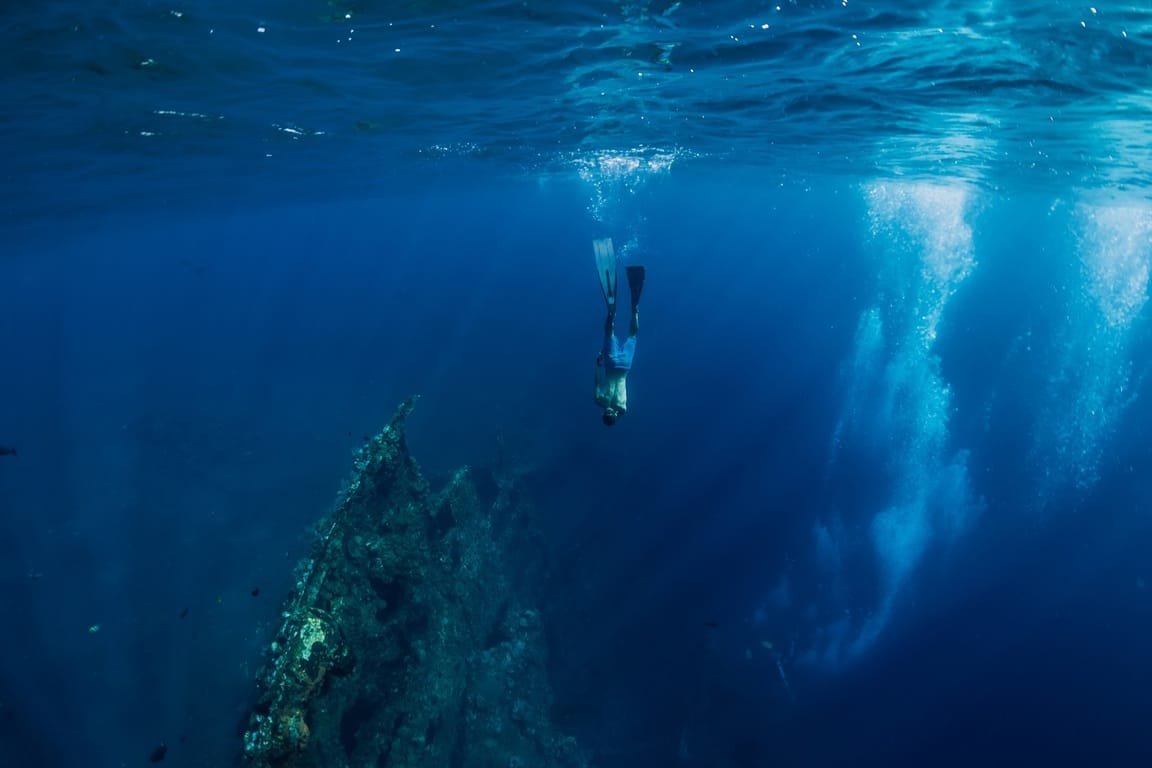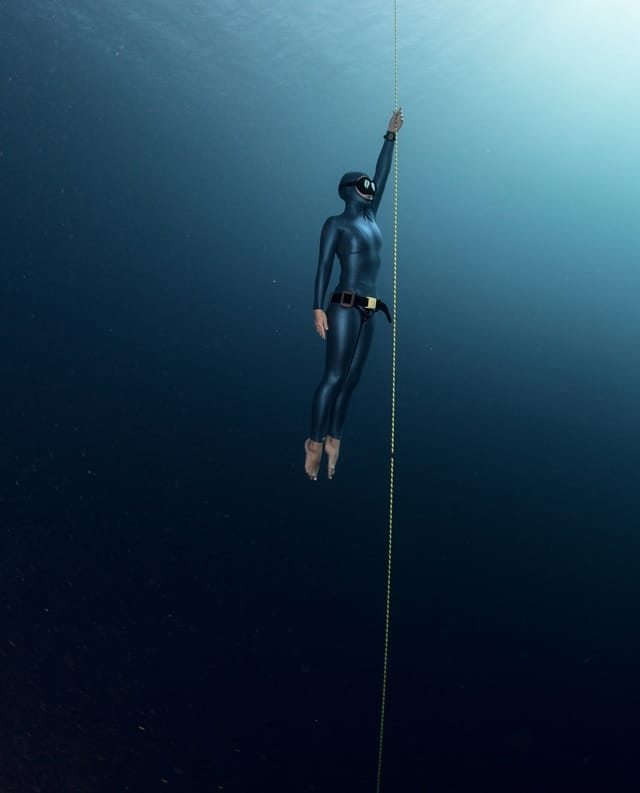David Mullins – Nudibranch Defences
Join us Thursday 30th Jan at 5:30pm to hear David Mullins talk about nudibranch defences

Hey everyone, I’m Matt, co-director of OceanSense Freediving here on the Sunny Coast.
Over the past couple of years, we’ve had the pleasure of teaming up with Scuba World to help bring freediving to life in our local community. Every time we head out on the boat, we’re always getting asked the same question by curious scuba divers: “Why on earth would you choose freediving over scuba?”
So today, I thought I’d take a moment to answer that question and share some of the awesome benefits freediving can bring to your scuba diving experience. If you’ve ever wondered what freediving is all about or whether it could make you a better scuba diver, keep reading – I’m about to give you some solid reasons to give it a go!
Now before we start, I’m not saying you should ditch your scuba gear for good, but if you’re already in love with the ocean and diving, freediving has some awesome benefits that can take your underwater experiences to the next level and even enhance life out of the water. Here’s why every scuba diver should at least give freediving a shot.
If you’re into scuba, you probably already know how important breathing is. The more you can control your air, the longer you stay underwater. But freediving? That takes breathing to a whole new level. When you’re freediving, there’s no tank to rely on, so everything depends on your ability to control your breathing and become a master of your breath and relaxation.
Freediving teaches you how to breathe more effectively, using techniques like diaphragmatic breathing and breath-holding. The breath control you develop in freediving is super beneficial for scuba divers too. Personally, I’ve noticed that when I return to scuba diving, I’m way more mindful of my breathing. This helps me conserve air more efficiently and stay calm under pressure. Now, for anyone out there thinking, “But wait—you’re not supposed to hold your breath or skip breaths in scuba!” I hear you, and I’m not suggesting you do that. What I am saying is that freediving helps you become more comfortable with higher CO2 levels, which in turn naturally slows down your breathing. This means you end up using less air overall and feel more relaxed while diving.
As a freediver, you learn to calm your nervous system and relax, which can really help with air management when you’re back in scuba gear. Plus, when you’re in an emergency or feeling anxious underwater, the ability to breathe slowly and stay calm makes a huge difference.

Freediving is one of the few sports that really forces you to be in tune with your body and mind. You’re not distracted by a bunch of equipment; it’s just you, the water, and your breath. This kind of focus is something I think every diver can benefit from, regardless of whether you’re diving with a tank or not.
In freediving, you learn to listen to your body’s signals—things like how your lungs feel, how your muscles are responding to the pressure, and how your mind reacts to stress or calm. That kind of mindfulness doesn’t just stay in the freediving world, either. As a scuba diver, I’ve found that this increased self-awareness helps me stay more composed in situations that might otherwise cause me stress. Instead of panicking when something goes wrong, I can focus on breathing and think my way through the situation. Sounds like hocus pocus stuff, but I promise this stuff really does work.
I think freediving teaches you something essential: how to be present. You’re not thinking about your gear, or your next dive, or your air supply—you’re just there, in the moment, with the ocean. When you take this mindset back to scuba diving, everything feels smoother and more controlled.
Another bonus of freediving is how it teaches you to master equalization. Freedivers have to be incredibly in tune with their bodies and the pressure changes as they descend and ascend, which makes equalizing second nature. A freediving course will often go more in depth into EQ as it can be harder to do when freediving. This awareness and understanding transfers directly to scuba diving, especially for newer divers. Being comfortable with pressure changes and equalization techniques in freediving can make you more efficient and confident when diving with a tank.
There’s something about freediving that gives you a totally different connection to the ocean. Without the heavy gear or the noise of bubbles, you can move silently through the water, almost like you’re part of it. Freediving forces you to slow down and feel the water around you in a way that’s hard to describe until you’ve done it.
As a scuba diver, you already know how amazing it is to be underwater. But freediving takes that experience to a whole different new level. You feel weightless, free, and completely immersed in the environment. It’s like you’re a part of the ocean rather than just observing it. It’s a deeply peaceful experience, and it makes you appreciate the underwater world in a whole new way.
When you’re a scuba diver, it’s easy to get caught up in checking your gauges, adjusting your gear, and keeping track of your dive time. Freediving, on the other hand, is all about just being in the water, breathing slowly, and moving with the current. You can’t help but develop a greater respect for the ocean. And when you bring that respect and mindfulness back to your scuba dives, everything feels more meaningful.
Freediving isn’t just about breath control—it’s also about fitness. To hold your breath for long periods of time and dive to greater depths, you need to have strong core muscles, good lung capacity, and cardiovascular fitness. Plus, being flexible helps a lot, especially for better finning and body movement.
All that physical conditioning you do for freediving will make you a better scuba diver too. I’ve noticed that freedivers tend to be stronger swimmers, and their general fitness helps with stamina on longer dives. The better shape you’re in, the less effort it takes to move through the water, which means you use less energy and air. If you’re looking to improve your overall diving performance, freediving gives you the perfect excuse to work on your strength and flexibility—and that pays off big time in scuba diving
If you’ve been diving for a while, you might be looking for something new to push your limits. Scuba diving is amazing and so is Freediving. It’s like comparing apples and oranges, both are fruit but taste so different! It’s not just about the dive—it’s about mastering your body and your breath. Every time you improve your breath-hold time, or make a new depth goal, it feels like a huge achievement.
There’s something super rewarding about pushing yourself in a completely different way. And once you start freediving, you’ll likely find that it makes you a better all-around diver—both in and out of the water. Whether you’re chasing new personal bests in depth or time, or just learning to be more present and mindful in the water, freediving is a challenge that will elevate your entire diving game.
So, if you’re a scuba diver, I really think you should give freediving a try. It’s not just about holding your breath for longer or going deeper—it’s about improving your breath control, learning more about your body, becoming a more mindful and safe diver, and connecting with the ocean in a whole new way.
Whether you’re looking to improve your scuba diving or just want a fresh challenge, freediving has a lot to offer. It’s an experience that will make you a better diver, but more importantly, it’ll make you a more connected, mindful, and confident one.
If Freediving is something you want to try, send us or scuba world a message and lets get you started! You can find more information at www.oceansense.com.au
Thanks for reading!
Join us Thursday 30th Jan at 5:30pm to hear David Mullins talk about nudibranch defences
Dear members, I would like to take this opportunity to inform you about a few
SUNRISE DIVES ARE BACK!!! Dear member, Mon 23rd & Mon 30th Sept we are diving